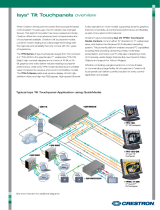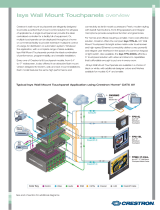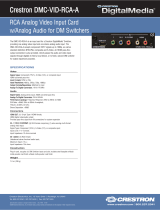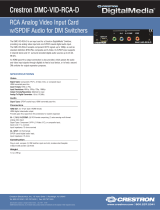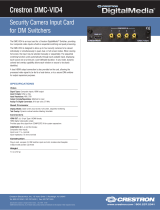Page is loading ...

> System switcher, audio processor, and control system
> Out-of-the-box switching and audio control
> 2 video/HDTV and 3 RGB/computer inputs
> 1 QuickMedia input with delay skew compensation
> Built-in input signal sensing | auto-switching capable
> Discrete composite, S-Video, component, and RGB outputs
> QuickMedia and Crestron Home CAT5 AV outputs
> 5 balanced stereo audio inputs
> 2 gated mic inputs with compressor & limiter
> 4-channel mic mixing w/4-band EQ per channel
> Discrete program, speech, and record outputs
> Graphic and parametric equalization | 40mS audio delay
> Built-in 40 watt amplifier — stereo, 70V, or 100V models
> 2-Series control engine | e-Control 2 Web server
> 10/100 Ethernet | RoomView and SNMP support
> 2 RS-232, 4 IR, 4 digital in, & 4 relay control ports
> Front panel setup and control | Backlit LCD display
> Keypad, touchpanel, and wireless control options
> Internal power supply | 2-space rack-mountable
The MPS-250 is a complete presentation control and signal routing solution for
boardrooms and classrooms. Integrating the control system, multimedia matrix
switcher, mic mixer, audio processor, amplifier, and QuickMedia distribution center
all into a single 2-space rackmount package, the MPS-250 affords considerable
signal routing versatility and high-performance signal processing without the need
for separate components.
System Switcher—Right out of the box, the MPS-250 provides high-performance
switching of 2 video and 3 RGB computer sources to a single projector or plasma
display. Composite, S-Video, component and RGBHV signals can be routed to the
appropriate inputs on the display device, with control of the display provided via
Ethernet, RS-232 or IR. Input signal sensing is provided on every video and RGB
input to enable auto-switching functionality and provide device power status
information to the control system. Selectable sync impedance on the RGB inputs
helps accommodate cable runs of varying lengths.
Versatile matrix switching inside the MPS-250 actually affords some additional
hidden signal routing flexibility, providing discrete switchable outputs for RGB,
composite, S-Video, and component signals. For instance, Outputs 1 and 2 can
function as separate composite and S-Video outputs, or as a single component
output; Output 3 can be a single component, S-Video, or composite output; and
Output 4 can be used for either RGB or component. Each output is fed by a
separate matrix crosspoint, so they all can be active simultaneously and assigned
any relevant input source.
Touchpanel Output—An additional discrete output is provided on the MPS-250 to
feed a preview signal to the system touchpanel or other monitor. This output is
controlled separately from the main display outputs, allowing a different source to
be viewed on the touchpanel. The touchpanel connection is facilitated through a
choice of QuickMedia
®
(QM) or Crestron Home
®
(CH) CAT5 Balanced Video
outputs, simplifying wiring to a wide range of Crestron touchpanels. The QM
output supports high-resolution RGB and HDTV plus audio, while the CH output is
limited to standard video and HDTV only (dependent upon the capabilities of
the touchpanel).
QuickMedia
®
—The QM Touchpanel output can also be used to feed signals
straight to the primary display device, providing a very streamlined, low-cost, long-
distance wiring solution. Crestron’s exclusive QuickMedia transport transmits
high-resolution RGB, HD video, stereo program and microphone audio signals
up to 450 feet over a single inexpensive CAT5e type cable*. Just one
CresCAT-QM cable and a QM receiver are all that is required for complete signal
routing and device control, eliminating all the bulky, expensive cabling that would
otherwise be needed.
A single QM input is also provided on the MPS-250, providing additional inputs
for AV, computer, and microphone sources through the simple connection of a
QM Wall Plate, FlipTop Box, or Distribution Center.
4-Channel Microphone Matrix Mixing—Two gated microphone/line inputs are
included on the MPS-250 complete with software-switchable 48V phantom
power and independently adjustable compression and limiting. Two additional
microphone signals can be brought in through the QM input, with 4-band
speech-optimized equalization provided on all 4 mic channels. Sophisticated
matrix mixing allows for four completely different mixes of all 4 microphones—
three mixes feeding discrete “local” outputs, and one additional mix feeding the
QM output.
Professional Audio Features—Five stereo audio inputs on the rear panel accept
balanced or unbalanced line-level signals from computers and other program
audio sources. Additional audio sources can be brought in through the QM input.
To accommodate a wide range of signals, adjustable input compensation is
employed to help maintain consistent volume levels when switching between
sources. Versatile matrix mixing allows the selected program signal and the 4
microphone signals to be separated or mixed in any combination to feed 3
“local” outputs, each with its own unique mix.
Three discrete balanced line level outputs are provided, each with independent
adjustments for volume, bass, treble, and mute. The stereo PROGRAM and
mono SPEECH outputs are normally intended for driving external amplification,
with relay muting on each output to prevent “thumping” on power up. The
RECORD output allows for a separate stereo mix to feed a recording device or
assistive listening system. Ten-band graphic equalization plus 2-band parametric
equalization on each output eliminates the need for expensive outboard audio
processors, and up to 40mS delay adjustment is available on the SPEECH output
for proper loudspeaker alignment.
The QM Touchpanel output is controlled separately from the other audio outputs,
allowing a different program source and microphone mix to be monitored on the
touchpanel, or output to other audio equipment by way of an appropriate QM
receiver or other QuickMedia device.
Built-in Amplifier—A 40-watt amplifier is built into the MPS-250, with three
models available offering the choice of 8-ohm stereo, 70V mono, or 100V mono
outputs. For large rooms requiring more power, the MPS-250 supports plug-
and-play compatibility with Crestron's QM-Series 3-channel amplifiers, providing
a complete solution for driving a professional loudspeaker system with discrete
program and speech channels.
Front Panel Control—Out of the box, the MPS-250 front panel supports easy
pushbutton routing of input sources to each of the outputs, and audio volume
adjustment using the volume control knob. Dedicated buttons and indicators are
also provided for separate control of system power and projector power. In
addition, five preset buttons are included for custom functions such as lowering
a projection screen, closing blinds, or selecting a lighting preset.
The front panel label strips are easily customized using Crestron Engraver
software or standard 3/8” tape labels, allowing for the clear designation of each
input, output, and preset button. When selected, these functions will also appear
on the LCD display as generic names (Input 1, 2…), or as custom names (DVD,
Podium PC, Screen Up, etc.).
www.crestron.com
|
800.237.2041
Crestron MPS-250
Multimedia Presentation
System 250

Crestron MPS-250 Multimedia Presentation System 250
Crestron Electronics, Inc.
15 Volvo Drive
l
Rockleigh, NJ 07647
Tel: 800.237.2041 / 201.767.3400
l
Fax: 201.767.1903
www.crestron.com
Easy setup of the MPS-250 is facilitated through the LCD display without
necessitating a computer. Together with 4 softkey buttons, 4 menu navigation
buttons and the volume knob, the LCD enables configuration of IP network,
audio, and other system settings. For security, the front panel controls can be
password protected or locked out.
2-Series Control System—Integrated into the MPS-250 is a Crestron 2-Series
Ethernet control system complete with e-Control
®
2 Web server and a host of
RS-232, IR, digital input and relay control ports for integration with third-party
equipment. Anything from a basic AV presentation room with a single projector,
screen, and keypad controller, to a fully custom touchpanel based system with
multiple controlled sources and display devices, can be programmed easily
using Crestron SystemBuilder™ software. And, the MPS-250 works with
Crestron's RoomView
®
Help Desk software, the industry's most comprehensive
facility-wide asset management solution.
Room Control Options—Without requiring any programming, the MPS-250
can be controlled simply using Crestron’s APAD LCD Controller or a selection
of keypads. With custom programming, Crestron’s complete line of Isys
®
touch-
panels and MediaManager FlipTops is supported. Equipped with an optional
CNXRMIRD IR receiver, the MPS-250 allows any Crestron IR wireless touch-
panel or handheld remote to be used for a low-cost wireless control solution.
Or, adding an RF wireless gateway or Wi-Fi access point enables use of a wide
range of 1-way and 2-way RF wireless handheld remotes and touchpanels.
AVAILABLE MODELS
MPS-250
Multimedia Presentation System w/Stereo Amplifier
MPS-250-70V
Multimedia Presentation System w/70 Volt Amplifier
MPS-250-100V
Multimedia Presentation System w/100 Volt Amplifier
SPECIFICATIONS
Processor
CPU: 32-bit Freescale ColdFire
®
Microprocessor
Memory
32 MB SDRAM, 256 KB NVRAM, 16 MB Flash
Operating System
Real-time, preemptive, multitasking kernel, multi-threaded; FAT32 file system with long
names; supports SIMPL™ Windows
®
and SIMPL+
®
Ethernet
10/100BaseT, static IP or DHCP/DNS, SSL, auto-negotiating, full duplex TCP/IP, UDP/IP,
CIP, SMTP, SNMP, built-in Web server and e-mail client; supports Crestron e-Control
®
2
XPanel and RoomView
®
applications
Video
Switcher: 6x5 crosspoint matrix including 1x1 QM signal routing, local QM delay skew
compensation
Signal Types: RGB and composite, S-Video, or component video (does not transcode)
Video/HDTV Formats: NTSC or PAL, HDTV up to 1080i/1080p
RGB Formats: RGBHV or RGBS
Maximum Resolution: 2048 X 1536 @ 60Hz (1920 X 1200 @ 60Hz via QM)
Blanking Time: < 0.1 second
Sync Rise/Fall Time: 3.5 ns maximum
Sync Latency: < 30 ns
Gain: 0dB (75 ohms terminated)
QM Cable Compensation: 10-bit digitally controlled PEAK (bandwidth) and BOOST (fre-
quency); 4-bit digitally controlled SKEW delay, 0 to 22 ns (independent for R, G, and B)
Audio
Switcher/Preamp: 6x2 stereo crosspoint matrix including 1x1 QM signal routing,
2-channel gated mic preamp with compressor & limiter, 4-channels mic EQ, 6X5
mic/program matrix mixer, 4x2 mic matrix mixer on the QM output, stereo volume/tone
control and EQ per each of PROGRAM and RECORD outputs, mono volume/tone control
and EQ/delay on SPEECH output, integrated power amplifier, QM auto-compensation with
self-peaking
A-D/D-A Conversion: 24-bit, 48 kHz
Volume Range: -80 to +20 dB, 0.1dB steps (output); -80 to 0 dB, 0.1dB steps (mixer)
Mute: -100dB (electronic), -120dB (relay)
Input Compensation: ±10dB, 0.1dB steps
Mic Input Gain: 0 to 100 % (40dB range) plus mute
Gate Level (Threshold): 0 to 100 %
Gate Attack: 0 to 100 mS
Gate Decay (Release): 0 to 5000 mS
Gate Depth: -80dB (mute) to 0dB, 0.1dB steps
Compression Threshold: -80dB to +20dB, 0.1dB steps
Limit Threshold: 0dB to 20dB, 0.1dB steps
Comp/Lim Attack: 0.1 to 300 mS
Comp/Lim Release: 1 to 500 mS
Compression Ratio: 1.0:1 to 10.0:1
Comp/Lim Curve: Selectable hard or soft knee
Mic EQ: ±12dB, 0.1 dB steps at 160, 500, 1.2k, 3k Hz
Bass/Treble: ±12dB, 0.5dB steps at 100Hz and 10kHz
Output Equalization: 10-band graphic (GEQ) + 2-band parametric (PEQ)
GEQ: ±12dB, 0.1dB steps at 31, 63, 125, 250, 500, 1k, 2k, 4k, 8k, 16k Hz
PEQ Filter Gain/Center Frequency: ±12dB, 0.1 dB steps at 25Hz to 20kHz, 0.5Hz steps
PEQ Filter Bandwidth: 0.1 to 3.0 octaves, 0.1 octave steps
PEQ Filter Types: Low Pass, High Pass, Peaking Eq, Notch, Treble Shelf, Bass Shelf
Speech Output Delay: 0 to 40 mS, 1mS steps
Frequency Response: 20Hz to 20kHz ±0.5dB (PROG/REC OUT), 50Hz to 20kHz ±0.5dB
(SPEECH OUT), 20Hz to 20kHz ±0.5dB (SPEAKER @ 8 ohms), 100Hz to 20kHz ±1.5dB
(SPEAKER @ 70V or 100V)
S/N Ratio: 95dB (PROG/REC OUT @ 10dBV, 20Hz to 20kHz A-weighted), 95dB (SPEECH
OUT @ 10dBV, 50Hz to 20kHz A-weighted), 90dB (SPEAKER @ 8 ohms, full output,
20Hz to 20kHz A-weighted), 90dB (SPEAKER @ 70V or 100V, full output, 20Hz to 20kHz
A-weighted)
THD+N: 0.02% (PROG/REC OUT @ 10dBV, 20Hz to 20kHz), 0.02% (SPEECH OUT @
10dBV, 50Hz to 20kHz), 0.7% (SPEAKER @ 8 ohms, full output, 20Hz to 20kHz), 0.7%
(SPEAKER @ 70V or 100V, full output, 100Hz to 20kHz A-weighted)
Stereo Separation: -80dB (PROG/REC OUT @ 10dBV, 20Hz to 20kHz), -60dB (SPEAKER
@ 8 ohms, full output, 20Hz to 20kHz)
Channel Crosstalk: -80dB (AUD IN @ 10dBV, 20Hz to 20kHz)
Connectors – Audio
PROG OUT: (1) 5-pin 3.5mm detachable terminal block, stereo line-level output
Output Impedance: 200 ohms balanced, 100 ohms unbalanced
Maximum Output Level: 4 V
RMS
balanced, 2 V
RMS
unbalanced
REC OUT: (1) 5-pin 3.5mm detachable terminal block, stereo line-level output
Output Impedance: 200 ohms balanced, 100 ohms unbalanced
Maximum Output Level: 4 V
RMS
balanced, 2 V
RMS
unbalanced
Note: Does not include relay mute
SPEECH OUT: (1) 3-pin 3.5mm detachable terminal block, mono line-level output

Output Impedance: 200 ohms balanced, 100 ohms unbalanced
Maximum Output Level: 4 V
RMS
balanced, 2 V
RMS
unbalanced
SPEAKER: (1 or 2) 2-pin 5mm detachable terminal blocks, speaker-level audio outputs
Wire Size: Connector accepts 12 AWG maximum
Output Power (MPS-250): 20W RMS per channel stereo into 8 ohms, 4 ohms tolerant
Output Power (MPS-250-70V): 40W RMS mono at 70 Volts
Output Power (MPS-250-100V): 40W RMS mono at 100 Volts
AUD IN 1 - 5: (5) 5-pin 3.5mm detachable terminal blocks, stereo line-level inputs
Input Impedance: 24k ohms balanced/unbalanced
Balanced Input Level: -20 to +12 dBV; 4 V
RMS
maximum
Unbalanced Input Level: -20 to +6 dBV; 2 V
RMS
maximum
MC/LN 1 - 2: (2) 5-pin 3.5mm detachable terminal blocks, comprises (2) mic/line inputs
Balanced Mic Input Level: -52 to -12 dBV, 240 mV
RMS
maximum
Balanced Line Input Level: -28 to +11 dBV, 3.7 V
RMS
maximum
Unbalanced Line Input Level: -34 to +5 dBV, 1.85 V
RMS
maximum
Mic Input Impedance: 3.9k ohms, accepts 60 to 600 ohm source
Line Input Impedance: 19k ohms balanced, 9.5k ohms unbalanced
Phantom Power: 10 mA (total) @ 48 Volts DC, software enabled to both mic inputs
Connectors – Video
COMP/Pb, Y/Y, C/Pr 1 - 2: (2) sets of (3) BNC female video inputs
Each set configurable as:
(1) Component/HDTV (YP
B
P
R
) video input, or
(1) S-Video (Y/C) input, or
(1) Composite input
Input Level/Impedance: 1 V
P-P
, 75 ohms, nominal
DC Offset: Insensitive to DC offset (AC coupled)
Video signal sensing on COMP/P
B
or Y/Y
RGBHV 3 - 5: (3) DB15HD female, RGBHV or Component/HDTV inputs
Format: RGBHV, RGBS, RG
S
B, or YP
B
P
R
RGB Input Level/Impedance: 1 V
P-P
, 75 ohms, nominal
Sync Input Level: 2 to 5 V
P-P
Sync Input Impedance: 75, 500, or 1k ohms individually selectable for H and V
Video signal sensing on H, G
S
, and Y; defeatable DDC pull-up resistors
QM INPUT QM 6: (1) 8-wire RJ45 female, QuickMedia input port
Signal Types: Dynamically configurable for RGBHV, component (YP
B
P
R
), S-Video (Y/C), or
composite video with stereo program and 2-channels microphone audio;
RGB Format: RGBHV, RGBS, RG
S
B
RGB Input Resolution, Non-interlaced: 1920 x 1200 maximum (60Hz limit at 1600 x 1200
or higher);
Video/HDTV Formats: NTSC or PAL, HDTV up to 1080i/1080p
Delay Skew Compensation: 0 to 22 nS
Connects to QM output of a QuickMedia device via CRESCAT-QM or CRESCAT-IM cable*
COMP/Pb OUTPUT 1: (1) BNC female
Composite video output, or P
B
of secondary component/HDTV video output;
Output Level/Impedance: 1.0 to 1.1 V
P-P
(terminated, with 1 V
P-P
input), 75 ohms nominal
Y/Y, C/Pr OUTPUT 2: (2) BNC female
S-Video (Y/C) video output, or Y and P
R
of secondary component/HDTV video output
Output Level/Impedance: 1.0 to 1.1 V
P-P
(terminated, with 1 V
P-P
input), 75 ohms nominal
COMP/Pb, Y/Y, C/Pr OUTPUT 3: (3) BNC female, configurable as:
(1) Component/HDTV (YP
B
P
R
) video output, or
(1) S-Video (Y/C) output, or
(1) Composite output
Output Level/Impedance: 1.0 to 1.1 V
P-P
(terminated, with 1 V
P-P
input), 75 ohms nominal
RGBHV OUTPUT 4: (1) DB15HD female, RGBHV or Component/HDTV output
Format: RGBHV, RGBS, RG
S
B, or YP
B
P
R
RGB Output Level: 0.7 to 0.75 V
P-P
(terminated, with 0.7 V
P-P
input, unity gain)
RGB Output Impedance: 75 ohms nominal
Sync Output Level/Impedance: 4 to 5 V
P-P
, 55 ohms
Sync Polarity: Follows input
TOUCHPANEL CH 5: (1) 8-wire RJ45 female, CAT5 balanced video output port
Dynamically configurable for component (YP
B
P
R
), S-Video (Y/C), or composite video
Video/HDTV Formats: NTSC or PAL, HDTV up to 1080i
Output Impedance: 100 ohms balanced
Connects to CH CAT5 balanced video input port of a compatible touchpanel or other
device via CresCAT cable
TOUCHPANEL QM 5: (1) 8-wire RJ45 female, QuickMedia output port
Signal Types: Dynamically configurable for RGBHV, component (YP
B
P
R
), S-Video (Y/C), or
composite video with stereo program and 2-channels microphone audio;
RGB Format: RGBHV, RGBS, RG
S
B
RGB Output Resolution, Non-interlaced: 1920 x 1200 maximum (60Hz limit at 1600 x
1200 or higher);
Video/HDTV Formats: NTSC or PAL, HDTV up to 1080i/1080p
Connects to QM input port of a compatible touchpanel or other QuickMedia device via
CresCAT-QM or CresCAT-IM cable*
Connectors – Control & Power
IR/SERIAL OUT A - D: (4) 2-pin 3.5mm detachable terminal blocks, IR/Serial output ports
IR output up to 1.2 MHz, 1-way serial TTL/RS-232 (0-5 Volts) up to 9600 baud
IR IN: (1) 3-pin 3.5mm detachable terminal block, for CNXRMIRD IR Receiver (sold
separately), allows control from IR wireless remotes using RC-5 command set
INPUT 1 - 4: (1) 5-pin 3.5mm detachable terminal block
Comprises (4) digital/contact closure inputs, rated for 0-24 Volts DC, referenced to GND
Input Impedance: 2.2k ohms pulled up to 5 Volts DC
Logic Threshold: 2.5 Volts DC nominal with 1 Volt hysteresis band
RELAY 1 - 4: (1) 8-pin 3.5mm detachable terminal block
Comprises (4) normally open, isolated relays
Rated 1 Amp, 30 Volts AC/DC, MOV arc suppression across contacts
COM A - B: (2) DB9 male, bidirectional RS-232 ports
Up to 115.2k baud, hardware and software handshaking support
LAN: (1) 8-wire RJ45 with 2 LED indicators, 10/100BaseT Ethernet port
Green LED indicates link status, yellow LED indicates Ethernet activity
Crestron MPS-250 Multimedia Presentation System 250
MPS-250
Multimedia
Presentation
System
Up to 2
Up to 3
Up to 2
LANLAN
Amplifier

NET: (4) 4-pin 3.5mm detachable terminal blocks, Cresnet Master ports, paralleled
Available Cresnet Power: 30 Watts
G: (1) 6-32 screw, chassis ground lug
100-240V~2.5A: (1) IEC Socket, main power input, removable power cord included
COMPUTER (front): (1) USB Type B female, computer console port, cable included
LCD Display
Green LCD alphanumeric, adjustable backlight, 2 lines x 20 characters per line, displays
input/output names, volume level, setup menus, time/date, and other system information
Controls and Indicators
NET: (1) yellow LED, indicates Cresnet bus activity
MSG: (1) yellow LED, indicates control system has generated an error message
HW-R: (1) recessed miniature pushbutton for hardware reset, reboots the control system
SW-R: (1) recessed miniature pushbutton for software reset, restarts the SIMPL program
SYS PWR: (1) pushbutton and green LED, controls system power
PROJ PWR: (1) pushbutton and green LED, controls display device power
SOFTKEYS: (4) pushbuttons for activation of LCD driven functions and passcode entry
MENU: (1) pushbutton, steps menu back one level
^
,V
: (2) pushbuttons, scroll up or down through menu and adjust menu parameters
ENTER: (1) pushbutton, executes highlighted menu or value
VOLUME: (1) continuous turn rotary encoder, adjusts menu parameters, defaults to
program audio volume
FUNCTION 1 – 5: (5) pushbuttons and red LEDs, programmable
IN 1 – 6: (6) pushbuttons and red LEDs, select input to be routed
OUT 1 – 5: (5) pushbuttons and red LEDs, select output destination
Power Requirements
Main Power: 2.5 Amps @ 100-240 Volts AC, 50/60 Hz
Available Cresnet Power: 30 Watts
Environmental
Temperature: 41° to 104°F (5° to 40°C)
Humidity: 10% to 90% RH (non-condensing)
Enclosure
Chassis: Steel, black matte powder coat finish, convection-cooled, vented top and sides
Faceplate: Extruded aluminum, black matte powder coat finish with polycarbonate label
overlay
Mounting: Freestanding or 2U 19” rack-mountable (adhesive feet and rack ears included)
Dimensions
Height: 3.56 in (9.03 cm), 3.47 in (8.81 cm) without feet
Width: 17.03 in (43.24 cm), 19.0 in (48.26 cm) with ears
Depth: 12.58 in (31.95 cm)
Weight
MPS-250: 10.1 lb (4.6 kg)
MPS-250-70V/100V: 11.9 lb (5.4 kg)
*
For QuickMedia wiring use CresCAT-QM, CresCAT-IM, or quality CAT5e/CAT6 cable with
a delay skew of
≤
15nS per 100m; the maximum aggregate cable length and delay skew
between any QM transmitter (origination point) and QM receiver (endpoint) is
450 ft (137 m) and 22 nS; a maximum of two QM midpoint devices may be inserted in
a given QM signal path; exceptions apply, refer to each respective product manual for
full detail.
Crestron Electronics, Inc.
15 Volvo Drive
l
Rockleigh, NJ 07647
Tel: 800.237.2041 / 201.767.3400
l
Fax: 201.767.1903
www.crestron.com
Specifications subject to change without notice. Doc.4805 05/08
All brand names, product names and trademarks are the property of their respective owners.
©2008 Crestron Electronics, Inc.
Crestron MPS-250 Multimedia Presentation System 250
APAD
Wall Mount LCD Controller
C2N-DB12
12-Button Decorator Keypad
CNX-B12
12-Button Designer Keypad
C2N-FTB
FlipTop Control Center
CNXRMIRD
IR Receiver
QM-AMP3X80MM
3-Channel Multimedia Amplifier
QM-AMP3X80SR
3-Channel Sound Reinforcement Amplifier
CNSP-XX
Custom Serial Interface Cable
IRP2
IR Probe
C2N-MNETGW
infiNET Gateway
CLW-DIM1RF and CLW-SW1RF
infiNET Dimmer and Switch
CLS-C6
iLux Integrated Lighting System
Internal Block Diagram – Audio
Internal Block Diagram – Video
AVAILABLE ACCESSORIES
/
